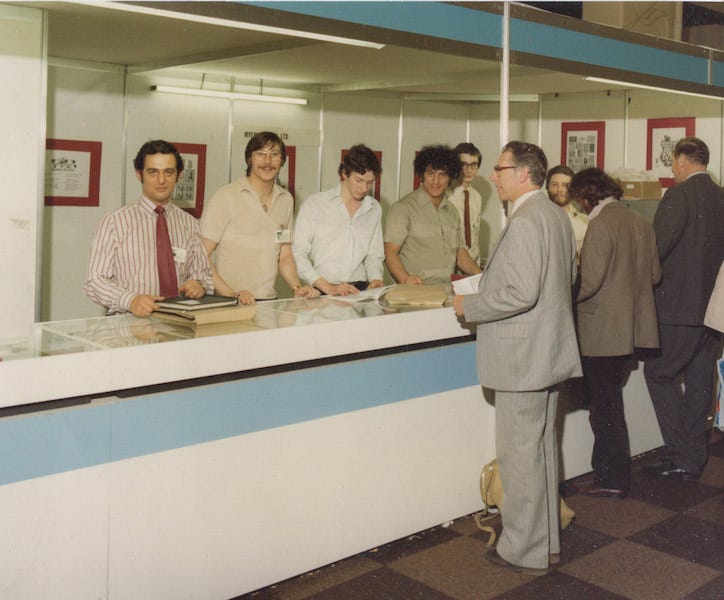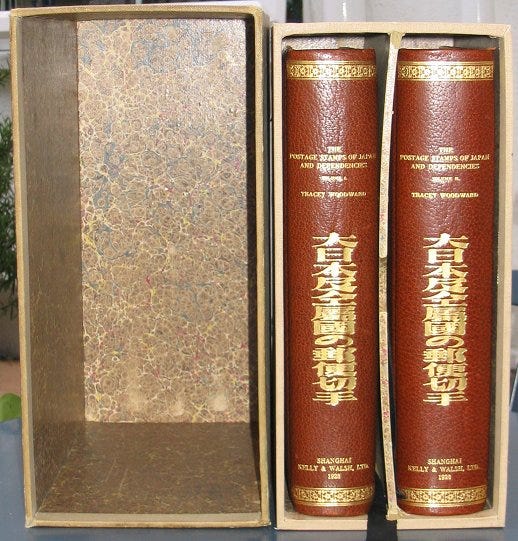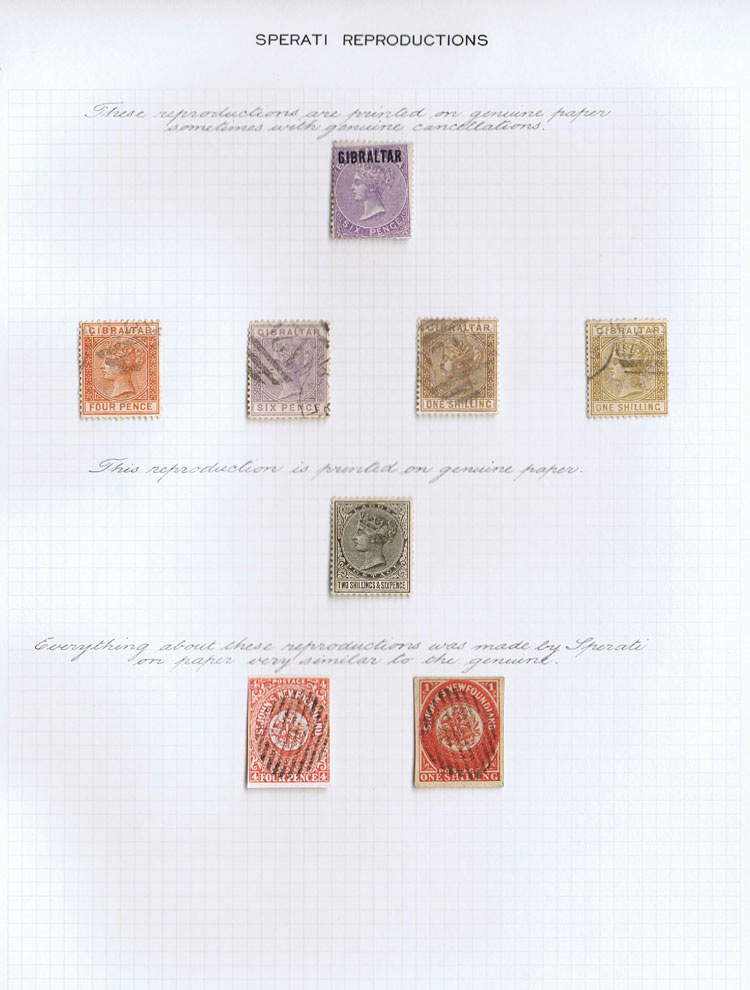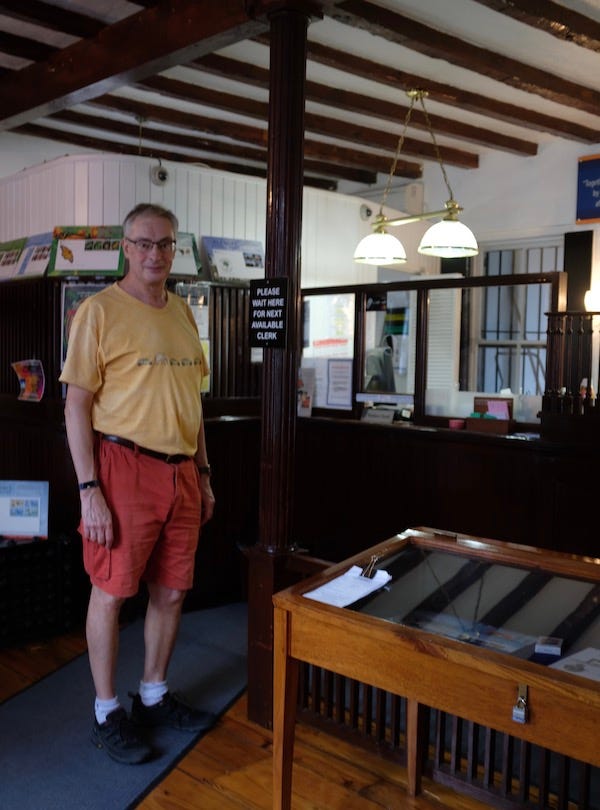The Bookseller of Knaresborough: An Interview with David Druett of Pennymead Books
Philatelic literature dealer and Caribbean specialist from Yorkshire
This article was first published as “The Bookseller of Knaresborough: An Interview with David Druett of Pennymead Books” Philatelic Literature Review 69 no. 1 (First Quarter 2020).
On a quiet street in Knaresborough, England, sits the home of Pennymead Auctions and Books, which was established as a one-man business in 1982 by David Druett (Figure 1). Pennymead Books boasts a specialized stock of secondhand and out-of-print books, (many of which, but not all, are philatelic). It specializes in Caribbean titles, ranging widely in topic: histories, economic overviews, memoirs, geology, and flora and fauna surveys, to name a few. It also stocks original maps, photographs, and prints, picture postcards, stamps, and covers (again specializing in the Caribbean). Finally, (and the reason for our interview), David Druett is one of the two main dealers of philatelic literature in the United Kingdom.
It was in late December of 2009 that I first wrote, hesitantly, to David inquiring about a couple of Indian auction catalogue titles. While he replied back quickly enough, I developed cold feet and went incommunicado for a few months; I was not sure whether I wanted to start spending money on buying books. It was only four months later that we completed our first transaction. In between we discussed prices and discounts and David was most patient explaining shipping and PayPal costs and why he could not reduce prices beyond a point. When I mentioned that the Indian Rupee traded at some 70 against the UK Pound (its 90+ now!), David retorted that 70 Rupees would buy more in India than in the UK. I was working in the foreign exchange markets and I knew this to be true and hence could not counter-argue. We concluded the transaction the next day. I think that if David were not so patient and accommodating with me, a stranger to him, it is possible that I would not be collecting literature today (or at least not to the current extent).
When I visited Leeds in 2018, I wished to meet David as well as Casper Pottle of HH Sales on the same day (It is some coincidence that the two main philatelic literature dealers in the United Kingdom live fairly close to each other). David mentioned that transportation logistics would make that difficult for me and offered to come down to HH Sales to catch up. That was quite a big favour and typical of David’s generosity. Though I must boast that David managed to pick up some bargains from Casper’s stock, thanks to me!
After my interview with Casper was published in the Fourth Quarter 2018 issue of The Philatelic Literature Review, I intended to do one with David as well but only after I had been to his place and seen his stock. However, this trip would not prove possible as soon as I hoped. At Stockholmia 2019, John W. Jackson, a well-known philatelic bibliophile, urged me to do the interview anyway. So here it is.
I spoke to David on a call using WhatsApp and sent him some questions. Based on his answers I had some additional questions and some clarifications. As is his habit, David has been extremely quick with his replies, and this has helped conclude this interview within a few days of our first call.
David, please tell me about yourself.
I was born in Surrey in 1961 and moved to Yorkshire when I was seven. I started collecting stamps around then and just got keener and keener. That was odd as neither of my parents ever collected. I joined Harrogate Philatelic Society when I was only 13 and exhibited at Stampex (British National Stamp Exhibition) when I was 16, winning a bronze. I started a collection of Trinidad stamps and was encouraged by Jim Lawrence, a member of Harrogate and a former editor of the Orange Free State Study Circle. He taught me “pure” philately1 which I found fascinating. I also joined the Roses Caribbean Study Circle and made friends with other Caribbean collectors. I left school at 18 and immediately got a job with Myers Stamps2 in Leeds (Figure 2), which held monthly auctions.
I have always been keen on sport; I am still playing badminton and cricket and umpiring hockey as well as cycling. I am an active Rotarian and the current vice president of my club for the second time. We are busy fundraising for Rotary End Polio campaign.

Before we start talking about your philatelic career, I would like to know about your better half. When I first bargained prices with you in 2010, you mentioned in an email’s postscript “I also know that Indians are great hagglers as I live with one!” When and where did you meet her?
I have been living with my partner, Chandy, since 1996. She is a physio at York hospital. However, we first met on the badminton court where she was my mixed doubles partner.
Could you tell me more about Myers Stamps and your experiences there? Did you work elsewhere after Myers Stamps?
Working for Myers Stamps was good fun. After six months in the packing room I was given the job of describer, one of a team of five. We held a monthly public auction, alternating between Leeds and Manchester, and then started holding large postal bid sales. Myers Stamps purchased a huge computer to cope with the postal bid sales as these had several thousand lots and over a thousand bid sheets coming in. Sadly, it all came to an end in the early 1980s, as the worldwide recession brought about a collapse in stamp values – which during the 1970s had been the best investment. The business staggered on until about 1984 before going bust.
How did you get into philatelic literature?
I was collecting books as a boy and fancied either being a stamp dealer or a secondhand bookseller. Following the recession of the early 1980s, I was made redundant in 1982 at Myers Stamps and so set up on my own as both a stamp dealer and secondhand bookseller. It seemed obvious to specialize in philatelic books as well as books on the Caribbean.
So you started dealing in books from 1982?
Yes. I put together a general secondhand stock by buying at local auctions and joined the P.B.F.A. (Provincial Booksellers Fairs Association). I started to open a stand at a number of fairs.
How did you learn the ropes of dealing in philatelic and non-philatelic items? Did you have a mentor or was time the teacher?
While working at Myers I could call on the assistance of senior describers. But I also learned much from the customers who I would chat to during the viewing. [I also learned from] attending stamp meetings at both the Harrogate and Leeds philatelic societies.
Is dealing in literature your full-time job?
I am kept busy full time adding new stock to my website and processing orders. I would say philatelic literature is about a third of my business, as I also sell stamps and covers, mostly of the Caribbean, and other antiquarian books, as well as maps and prints. I like the variety and have found it useful over the years, as at times some parts of my business seem to become very unpopular while others flourish.
(Author’s Note: To illustrate David’s point, the highest priced philatelic book on David’s website currently [as of March 2020] is Mirabaud and Reuterskiöld’s The Postage Stamps of Switzerland 1843-1862 priced at £2,000 whereas the highest priced non-philatelic items are a map of Grenada at £7,500, and a historical book on British Guiana at £14,000!)
Did you ever publish regular price lists of literature in stock?
I tried a few lists which I sent out with my postal auctions of West Indies stamps under the banner of Pennymead Auctions and also to those who requested lists after seeing advertising in the philatelic press. These were not very successful. Prior to having a website, philatelic literature was only a very small part of my business. Turnover of stamps and covers accounted for at least 90% of my business.
What is the meaning of Pennymead by the way?
Pennymead was the name of my parents’ home where I initially traded from. It was named after Pennymead Lake in East Horsley. I used this name because I was not tied to selling any particular product nor any locality which is important when you are only 21.
When did you start dealing on the internet? What was your experience in the initial days?
I realized the importance of the internet back in 1990’s and got an e-mail address. I went to a night school course on web design and built my own website which went live in 2000.
Having my own website gave me an easy way to offer philatelic books, and as I listed more sales grew. This was good as my stamp auctions were going downhill. I blamed this on eBay which was offering huge amounts of the more common material at low prices on a weekly basis. I could not attract enough good consignments of rare material and so gave them up in 2008. This coincided with the period when I got my current website, which has a shopping cart and interactive database. I decided to concentrate on online retailing. This suits me well as I get a few orders every day and thus have a balanced workload.
Apart from your website, you also sell on Abebooks but not on eBay or Amazon. Why is that? Do you sell a lot on Abebooks?
I do have about 500 items on Amazon, mostly modern books, as they only like books with ISBN numbers. I rarely use eBay for selling as their charges are too high and further, I get enough business from my own website. Sales on Abebooks are reasonable but I think many customers find books there but then purchase directly from my own site as the prices are lower.
How is your company structured? Is it a sole-owner company?
Yes, I am a sole trader.
Your mentioned over phone that you have almost 8,000 philatelic and non-philatelic titles in stock. Is all your stock listed on the internet?
I have 7,500 items for sale on my website. This includes philatelic books, books on the Caribbean and miscellaneous stock as well as stamps and covers, postcards, photos, maps, and prints. The aim is to have everything on the website but obviously I am a little behind.
What is your buying strategy if you manage to put all your stock on the net? Do you then not buy libraries?
Buying well means buying wherever an opportunity presents itself. I attend auctions and visit fairs, but also am invited to make offers for collections and libraries from customers and relatives of former customers.
Following up on the first question, do you still collect? Do you exhibit?
I am currently President of the Harrogate Philatelic Society. I am now in my second year of office with a second presidential display to give, so am kept busy writing up.3 I have also been encouraged to exhibit which I did for the first time last year at the Yorkshire Philatelic Association convention. I have collections of Trinidad & Tobago, local postal history, Scottish Additional Halfs [halfpenny mail tax marks] and world postal stationery postal cards up to 1900. The latter collection gives me much scope to find new material every week. I also collect local postcards and postcards of the Caribbean.
What is your typical day like? Do you have any employees in your business?
I work entirely on my own from my home in Knaresborough (Figure 3). I often find I sell more while I am asleep so the day begins with picking the new orders, sending invoices and packing. Then, a visit to the Post Office at lunchtime before returning with a sandwich. Afternoons are spent adding new stock or going off to view auctions.
Where do you get orders from? What would be the typical breakup between say the UK, US, Europe, Asia, and Australia?
This varies; there’s a notable fall in sales to the U.S. over the years and an increase in sales to Europe. Possibly, sales are now about 25% to the U.K., 35% to Europe, 10% to Australia and the U.S. each, and 20% elsewhere.
Recently I had my first order from Iraq; a stamp collector in Baghdad. I have also had orders from Addis Ababa, Falkland Islands, and far-flung parts of South America.
You only stock second-hand out-of-print books but not the latest titles. Why do you not do this?
I am publications officer for the British West Indies Study Circle and offer a few new titles on behalf of other authors. But selling new books is not something I want to be too involved with as it is far too much like hard work. There is certainly an opportunity for someone to do this in the UK since Vera Trinder4 stopped trading but it is not easy as the profit margins offered to the trade on philatelic books are far too small. Authors and philatelic societies fail to realize the high costs of selling online faced by small businesses.
Do you fulfill want lists when you do not have certain titles in stock?
I don’t like wants lists. I have no system for checking new stock against them. Buying items especially because they are on someone’s wants list usually results in profound disappointment as the customer invariably says they have already bought it somewhere else.
You must have a list of your own favourite philatelic literature titles? Which are those?
I rather like the quirky Higlett guides produced from the 1930’s to 1950s. Higlett produced one for the Harrogate Philatelic Congress of 1921 giving a light hearted account of what transpired and poking gentle fun at the philatelic dignitaries’ present.
The works produced by Sidney Turner in limited editions, usually on handmade paper are lovely to handle. For example, Turner’s Forgeries of the Centavo Issue of the Paquete Stamps of La Guaira 1864 – 1869 (1914).
Please give us some flavour of some big-ticket purchases that you have done in the past.
I have twice had the first edition of Tracey Woodward’s Stamps of Japan (Figure 4). More recently I had the rare Part III & IV Sperati containing actual examples. I have also had a Fournier album.

How do you break down libraries? Do you sell only the important titles and sell the balance in auctions or collections?
I tend to offer everything which I feel somebody might want individually on my website. I give away very common works or items in poor condition.
Some purchases must have given you greater satisfaction than usual? Can you tell us more about your experience with them.
Bill Lea, the well-known London stamp dealer, had the best philatelic literature library which I have so far purchased so far. There are many others but I do not want to name them since they are still alive.
Please share your experiences with some of your most memorable buyers.
Once again I am not sure I can do so without permission. I have many good regular buyers abroad but have never met them and I am not sure how they would react if I were to name them.
(Author’s Note: Since David was not keen to disclose client information, and rightly so, I wrote to some bibliophiles, some of whom I knew were and some whom I guessed might be Pennymead clients. See the sidebar for their experiences and feedback.)
Bibliophiles’ Talk about David Druett
“I first met David in the early 1980s and bought the odd book from him. I have bought more in the past ten years or so since I started more serious book collecting. The most memorable book I have bought from him is probably The Half-Lengths of Victoria (1953) by J.R.W. Purves. One of the greatest single issue handbooks ever written and the copy is No. 1 of a limited edition of 120 copies. It was from the library of the famous classics dealer W.E. Lea. It was bought for my collection of Crawford Medal Winners.
David is honest, fair, and straightforward to deal with - even if you do not always agree with his pricing! His stock is always good quality.”
…John W. Jackson, UK
“I started dealing with David in the 1980s when he was operating Pennymead Auctions, selling stamps and postal history as well as some publications. I have over the years bought some very nice publications from David, my favourite being the Handbook of The Cayman Islands 1909. It cost £175 at the time, which to me was quite a lot of money. But it is a very rare publication and when I acquired my copy the Cayman Island National Archive did not hold one and this may still be true today.
David is reputable dealer who has integrity and treats his customers as friends.”
…James Podger, UK
“I think I started dealing with David a dozen years ago. I have bought from him books especially about two of my collecting interests: British West Indies (maritime mail) and Samoa (before 1900). David is a retailer of the books that the British West Indies Study Circle publishes, and he also keeps a good stock of out-of-print works. I have purchased many books authored by L.E. Britnor. But Samoa in particular was rich in interesting findings. I bought the fifth volume of The Postage Stamps of New Zealand (1967) by R. J. G. Collins which deals with the stamps and postal history of the Pacific Islands under New Zealand administration, Samoa, and the Ross Dependency. A 1,000 copies limited edition, I got it for £125; in my opinion a bargain price. I also purchased The Samoa Express Postage Stamps (1916) by R. B. Yardley for £80.
David has an excellent website to browse, where choices and purchases are very easy to make. His stock of philatelic literature is large and so he offers a great possibility of perusing to collectors. In my opinion, prices are good. Maybe he should start newsletter to keep customers regularly updated, especially regarding new additions of second-hand books.”
…Luca Lavagnino, Italy
“My saved emails indicate that I was dealing with David in 2012, but I probably bought from him before that as well. I have experienced it very often that books from the island (UK) smell a bit strange and the paper seems to have gotten wet, which confirms my prejudice, that there is a lot of rain and fog in England. The best thing about David's books is: They do not smell! I hope that our longstanding uncomplicated supply relationship will not be made more difficult by Brexit.”
…Rudolf Buschhaus, Germany
Who do you think are your competitor dealers in the UK and abroad? Do you meet each other often?
I believe there is only Casper Pottle of HH Sales and myself here in the U.K. and I see Casper more as a colleague than a competitor. I am happy to pass on customers where I feel he may be able to help them more than I can. There is also Edmunds and Turner, who sell on eBay, but I think philatelic literature is only a small part of their business. Philabooks in Germany has the biggest stock and does supply new titles, and I think it must be the biggest dealer in the world. I have no contact with any of the U.S. dealers.
The heydays of philatelic literature was probably from the 1970s to the early 2000s. Most literature items achieved sky high prices then and these days sell for a fraction of them. Why do you think this has happened?
The internet has created a far more perfect market, one where the buyers can find out how many copies of a particular book are for sale and what prices are being asked. It has had the effect of pulling prices down as sellers will reduce prices in order to have the cheapest copy for sale. There are not as many collectors as there used to be so there is less overall demand and thus more unwanted copies for sale. The market for journals has collapsed as most of these are now mostly available digitally on the web.
Which titles in the recent years do you think have been the most popular and have held on to their value?
The latest handbook on any subject which has not been published in excessive quantity will appreciate once out of print until it is either reprinted or replaced by a better work at which point it will then fall in value.
I would put any book written by Colin Tabeart in this list. He is undoubtedly a favourite author for a philatelic literature dealer!
Some other recent books I would also name are Derek Diamond’s The 1898 Pictorial Issue of New Zealand. Its Design, Printings and Use (2014) and John Parmenter and Ken Gordon’s GB Used Abroad: Cancellations and Postal Markings (2016).
Which out-of-print titles immediately sell when you list them?
Most truly rare books will sell quickly if priced sensibly. For example, The Work of Jean De Sperati. I listed Part III and IV (6pp + 2 linen album leaves with 13 Sperati forgeries individually hinged on to the pages) a few months back for £1,500 and it sold within hours. Another title I sold pretty quickly recently was De Timbres-Poste de Pologne aux XVIII et XIX Siecles (1920) by W. de Polanski for £600.

Which title have you wished you could handle but never managed to?
None that I can think of.
How long do you wish to continue dealing in literature?
Even if I stopped buying new stock now, I don’t think I could live long enough to see it all sell so it will have to continue for as long as I am fit and able.
Acknowledgements: I would like to thank David for patiently answering my questions. Any feedback or information can be shared on my email id: abbh@hotmail.com or on my twitter handle @abhuwalka.
That is, in David’s words, the study of paper, watermarks, perforations, overprints and how varieties are created.
Myers stamps started trading in about 1976 and ran till around 1986 holding monthly auctions in Leeds and Manchester as well as some very large postal auctions. It was owned by Steve and Howard Myers.
In the United Kingdom, presidents of philatelic societies are required to present stamp displays once or twice in their tenure. This applies to the Royal Philatelic Society, London and often, as David confirms, to the smaller societies as well.
Vera Trinder (Webster before her marriage) joined Albert H. Harris, then perhaps the largest philatelic literature dealer in the world, sometime in 1939/40. She quickly rose to become part of the senior management in Harris Publications Ltd. In 1969 she left to start her own firm specialising in literature and catalogs and stamp accessories. She sold her business to Prinz Publications (UK) Ltd in 2006. In 2014, her iconic bricks and mortar shop in London shut down. Trinder died in June 2016.







